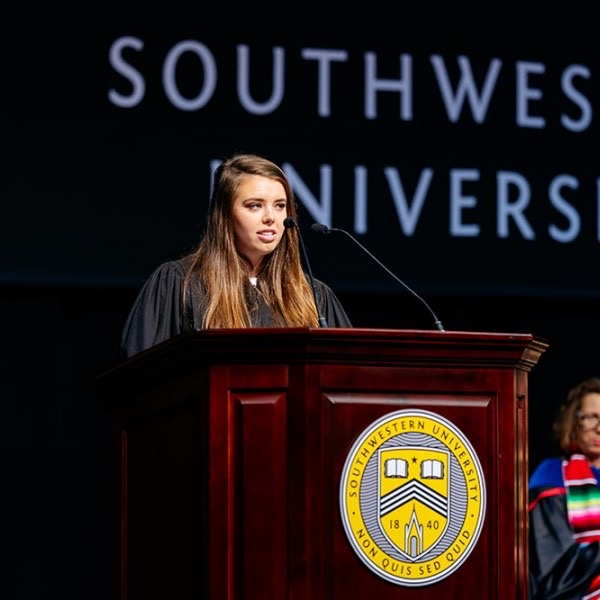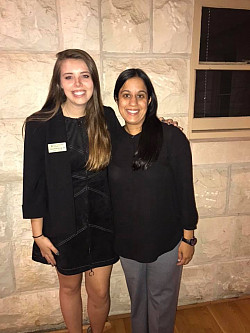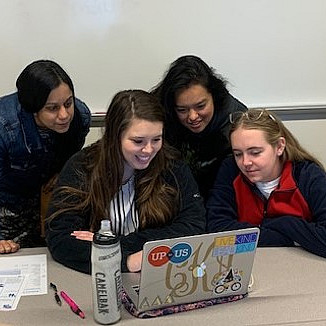News
A Future CEO
December 08, 2020
December 08, 2020
Open gallery

Until her junior year in high school, Courtney King ’20 had one ambition: “My whole goal was to be a professional soccer player,” she reveals. “That’s all I wanted to do.” Unfortunately, as so many young athletes can attest, injury changed her plans. Two ACL reconstructions and a third knee surgery later, King recalls, “I saw the writing on the wall. I didn’t know if I wanted to do soccer anymore.”
As she worked through her recovery, however, the Houston native discovered a new career goal: physical therapy. It was a natural progression: becoming a physical therapist would allow her to work with the athletes she still loved being around while achieving her ultimate goal of having a positive impact on others. So, having originally been recruited the previous year by a soccer coach at Southwestern University, she knew she had found her university home, but she swapped plans of being a collegiate student–athlete with pursuing a degree in kinesiology. A consummate planner—a characteristic that would shape her academic and cocurricular experiences at SU—King registered for the required classes and sought out professors and professionals who gave her insights into preparing for PT school after graduation.
“Something that’s never changed between wanting to be a professional soccer player, kinesiology, and business is I’ve wanted to change the world, to make the world a better place.”
But, she reveals, something wasn’t quite right. “I was having a hard time with my science classes,” she remembers. “I did fine, but, to be honest, I just didn’t look forward to class, I couldn’t motivate myself to study, and I was second-guessing that kines[iology] was for me.” Fortunately, King was attending informal recruiting events for the local chapter of Delta Delta Delta, one of SU’s six national sororities. One in particular would prove to be life changing: Tri Delta’s Last Lecture, an event at which a professor chosen by the sisters speaks to the group about a life lesson that’s connected with their field. Serendipitously, the speaker that fall was Debika Sihi, now associate professor and chair of business. King was spellbound by Sihi’s inspiring message. “I remember hearing her talk and thinking, I have to meet this woman! I need to take a class with her,” King says.
King approached the much-loved business professor after the talk, introduced
It might seem strange that a student would go from dreaming of a career in professional soccer to planning for one in physical therapy to landing on the path toward business leadership. “I was looking at my computer [the other day], and … my four-year plan from my freshman year [was] very different,” King laughs. But, she adds, “something that’s never changed between wanting to be a professional soccer player, kinesiology, and business is I’ve wanted to change the world, to make the world a better place.”
A commitment to human beings
As one might expect from a liberal-arts graduate who plans to run her own business, the success of a company for King will ultimately be measured by whether she improves the lives of human beings. “I care about other people,” she asserts. “Other people motivate me to do what I do.”
While taking a course on the Foundations of Business, for example, she was “really struck” by one particular lesson about the importance of global and intercultural awareness. “I never want to be that business professional that does not succeed because I’m not able to understand or be empathetic to other cultures,” she remarks.
One way that King decided to expand her worldview was to begin taking courses in religion, in which she eventually declared a minor. She had attended a private Christian high school and “appreciated that,” she reflects, but at SU, she wanted to gain further insights into other religions, such as Hinduism and Buddhism. And being one of the only business majors in her religion classes meant that she could bridge different subject areas in a way that reflects the university’s approach to higher education.
“It’s that lifelong-learning thing that’s outside the classroom,” King says. “That’s what they talked about with Paideia: there are so many different connections. The whole purpose of Paideia is to broaden your mind beyond what’s right in front of you, and I feel like my religion minor, my internships, and all these other things have allowed me to do that.”
A life-changing internship
King certainly expanded her thinking and found her niche majoring in business. By her senior year, she was so engaged in her coursework that she elected two capstones—“don’t ask why,” she says with a laugh, “but they’re different, and it’s super-fun!” She was also completing her proposal for the business she wants to open—a centralized location that makes it easier for couples to discover and purchase wedding services—while completing a new yearlong class, Southwestern’s Lab for Innovative Ventures and Entrepreneurship, or LIVE, for which she is a vocal champion.
But perhaps one of the most significant experiences of her college career was a summer internship she undertook with Emily Calhoun ’07, an SU alum and owner of Floriography Flowers, in Albuquerque, New Mexico, who King connected with through Southwestern’s Alumni Network Mentoring Program. King admits that at first, she wasn’t sure the position was for her: she had never worked outside Texas, she had never lived by herself, she didn’t consider floristry a career path for her, and she did not yet know Calhoun well. But King ended up taking advantage of the opportunity, one that opened her eyes to the wedding industry. It was the field King would later hope to disrupt with her LIVE business plan and where she’d land immediately after SU—one of her current positions is assistant wedding and event consultant for Keely Thorne Events, in Houston. The internship also taught her the ins and outs of owning a business, a crucial part of King’s career ambitions. Moreover, she gained the confidence one develops when living independently in a new environment and learning on the job.
“[It was] the most unexpected summer, I would say, where I made that lifelong connection with Emily,” King reflects. “It changed my life completely. It was so out of my comfort zone, [and] I was so terrified, but I grew so much—not just getting résumé bullets but in so many different ways. I got a mentor and an experience that changed my life, all in three months. Just amazing!”
“100 miles per hour”
The phrase “100 miles per hour” comes up often when King is describing how she approaches, well, almost anything, whether that’s her academic coursework or her cocurricular involvement. She was a go-getter in middle and high school, serving in Student Council for eight years and as president for five, so none of King’s many cocurricular engagements at Southwestern were a surprise. After her stint at Floriography, she would take on three other internships: one at the Georgetown Convention and Visitor Bureau, another at Keely Thorne Events (one of her current employers), and still another at Turner Commercial Properties. Meanwhile, she was working multiple on-campus jobs. She had joined and would go on to chair Student Foundation, an organization that supports SU fundraising, through which she would coordinate SING!, the university’s annual talent show, and develop a better understanding of how the university works. She served as president of the Honor Code Council. And after joining Tri Delta, she quickly rose to the position of philanthropy chair and then vice president of membership.
“I have loved my time in Tri Delta because I’ve felt like I’ve had such autonomy,” King remarks. “I love being able just to run with it, … [to ask], ‘What am I adding to this? What can I do to better this position before I leave?’” As vice president of membership, King worked tirelessly to make an impact on the organization, achieving one of the highest percentages of bid-matching ratios of all 141 chapters in the U.S. And her commitment to making lives better was apparent in her service as the Tri Delta philanthropy chair. In that position, she used her skills in event planning—always with an eye toward efficiency and budget consciousness—to coordinate new fundraising events. For example, she created and implemented Deltas on the Block, raising $1,000 for Tri Delta’s national philanthropic partner, St. Jude’s Children’s Research Hospital. As any event planner would tell you, coordinating such fundraisers can be frustrating and stressful at times, but, in the end, “It was just such a joy to do that,” King says with pride and delight. And through careful negotiation, creative planning, and even learning how to drive a 15-person bus with her sorority’s advisor, King was able to add a trip to St. Jude’s, located in Memphis, Tennessee, allowing 11 chapter members to see for themselves the impact they were having on the lives of children with cancer through their fundraising efforts.
The SU grad’s interests extend from improving people’s lives to enhancing how
organizations work. This goal was on display last year when Tri Delta gave her the
At the convention, King and Yannon learned at the last minute that they wouldn’t be presenting their pitch to five volunteer judges; instead, they’d be touting their plan to an auditorium of more than 1,000 Tri Delta members from across North America. King and Yannon contacted Sihi in a panic, who assured them that they were more than ready.
“So we pitched it, and I will say that we were so prepared—the questions were not hard at all compared with what Dr. Sihi had asked!” King remembers. “We ended up winning, which was so incredible! It was an amazing experience for me.” Moreover, when she would tell Tri Deltas from other universities that Sihi had been instrumental in her preparation, she was surprised that they were so surprised—and, in some cases, envious. “Everyone was like, ‘Your advisor helped you? What?’ It was so foreign to them, and people were saying, ‘I wish I had that relationship with my professors!’” she says. “In that moment, I just felt so, so lucky.”
For her many contributions to Tri Delta and the SU community, King was honored with the 2020 Greek Woman of the Year Award as well as an Emerging Leader Award. However, for all of her many achievements and innovative ventures on campus, King says that “you can be given all these things, but you have to take advantage of them.” Seizing that initiative, she says, helped earn her a spot this spring as a member of the Southwestern University Board of Trustees, a position she’s been eyeing since becoming part of Student Foundation her first year. “I think the only reason that was possible was because of the relationships I’d made through these organizations, and it’s so special,” she says.
A leader with heart
King graduated in May with honors in business and Paideia with Distinction. In addition to working as an assistant wedding and event consultant, she’s still running 100 miles per hour with a second job as a severance tax consultant for Ryan LLC, a global tax services, software, and technology firm. She also plans to keep submitting her LIVE business plan to Mass Challenge, a competitive startup accelerator, and to continue seeking investors. But it’s clear that whether she looks back or to the future, it’s the people that matter most.
That heartfelt investment is mirrored, she says, by her alma mater.
“Southwestern focuses on developing a person beyond their [academics], to do better in the community,” she reflects. And that’s evidenced, King adds, by the continuing relationship she has with her business professors and mentors. “[Professor] Ross and Dr. Sihi—there’s just no one else like them,” she says affectionately. “They are as invested in my personal life, my professional life, and just things I’m going through as [they were] in my classes and the assignments. They’re so esteemed and established, and their credentials are spectacular, and it’s an honor to be taught by both of them. They just continually pour into their students… . Aside from their support, I just look up to both of them.”
“If there’s one thing losing soccer taught me—and my dad found this quote for me when I quit—it’s that trophies and medals gather dust in time, but the relationships and the people and the impact they have, those last forever.”
Ultimately, it’s people like Ross and Sihi who King cherishes most from her Southwestern Experience. As she forges ahead toward her goal of realizing her business and becoming a successful CEO, continuing to connect with others will undoubtedly remain the lesson that stays with her longest. “It’s the people I’ve met from working in the University Relations office, through doing Student Foundation, through TriDelta, through internships… . It’s the people I’m going to miss the most,” she shares. “If there’s one thing losing soccer taught me—and my dad found this quote for me when I quit—it’s that trophies and medals gather dust in time, but the relationships and the people and the impact they have, those last forever.”

















